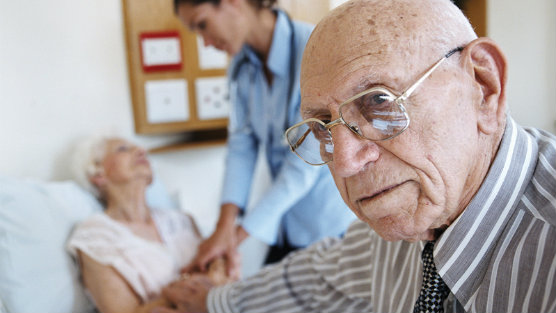Palliative Care and Hospice Education and Training Act (PCHETA)

 Nearly half of all people with Alzheimer’s and other dementias are in hospice care at the time of their death. Less than half of surveyed nursing homes have some sort of palliative care program. For people with advanced dementia, such care – which focuses on managing and easing symptoms, reducing pain and stress, and increasing comfort – improves quality of life, controls costs, and enhances patient and family satisfaction. But, as the demand for such care grows with the aging population, more must be done to ensure an adequately trained workforce. The Palliative Care and Hospice Education and Training Act (S.693/H.R.1676) would increase palliative care and hospice training for health care professionals, launch a national campaign to inform patients and families about the benefits of palliative care, and enhance research on improving the delivery of palliative care.
Nearly half of all people with Alzheimer’s and other dementias are in hospice care at the time of their death. Less than half of surveyed nursing homes have some sort of palliative care program. For people with advanced dementia, such care – which focuses on managing and easing symptoms, reducing pain and stress, and increasing comfort – improves quality of life, controls costs, and enhances patient and family satisfaction. But, as the demand for such care grows with the aging population, more must be done to ensure an adequately trained workforce. The Palliative Care and Hospice Education and Training Act (S.693/H.R.1676) would increase palliative care and hospice training for health care professionals, launch a national campaign to inform patients and families about the benefits of palliative care, and enhance research on improving the delivery of palliative care.
View the fact sheet
The Alzheimer’s Association strongly supports the bipartisan Palliative Care and Hospice Education and Training Act (PCHETA), which is being reintroduced by Representative Eliot Engel (D-NY- 16) and Representative Tom Reed (R-NY- 23) in the U.S. House of Representatives and Senator Tammy Baldwin (D-WI) and Senator Shelley Moore Capito (R-WV) in the Senate.
View the current Senate and House cosponsors
Palliative and hospice care are important services for people with Alzheimer’s and other dementias.
- A recent study shows that nursing home residents with dementia who receive palliative care at the end of life, compared with those who do not receive such care, are up to 15 times less likely to die in a hospital, nearly 2.5 times less likely to have a hospitalization in the last 30 days of life and up to 4.6 times less likely to visit the emergency room in the last week of life.
- Of all people living with dementia, 18.6 percent are currently in hospice care – a higher percentage than other chronic conditions – and one in every six seniors in hospice care has a primary hospice diagnosis of Alzheimer’s or another dementia.
- Nearly half of all people with dementia die in hospice care.However, the availability and quality of palliative and hospice care is a concern.
- Less than half of surveyed nursing homes report having some sort of palliative care program.
- Of those nursing homes with a palliative care program, only 42 percent include consultation by a physician certified in hospice/palliative care, and only 28 percent had a designated director of palliative care.
To address these issues, PCHETA establishes palliative care workforce training programs for doctors, nurses and other health professionals by:
- Providing grants to medical schools and teaching hospitals to train physicians to teach palliative medicine.
- Creating career development awards for hospice and palliative medicine faculty.
- Establishing workforce development fellowships in palliative medicine for doctors, nurses, social workers, chaplains and other allied health professionals.
- Providing career incentive awards for nurses, clinical social workers and pharmacists who agree to teach or practice palliative medicine for a period of five years.
- Creating preferences in existing programs emphasizing nurse retention and nurse education, practice and quality in hospice and palliative medicine.
View the fact sheet
PCHETA also would launch a national palliative care education and awareness campaign to:
- Inform patients, families and health professionals about the benefits of palliative care.
- Create and disseminate information about available palliative care services.
Finally, PCHETA enhances research in palliative care by:
- Directing the National Institutes of Health (NIH) to use existing authorities and funds to develop a research strategy in palliative care to address quality of care and quality of life for patients with serious illnesses.
- Expanding research at the NIH for palliative care, pain management and symptom management.
- Establishing a program to educate patients and caregivers about the palliative care delivery model.
- Creating an education and training program for allied health professionals, including nurses, nursing assistants, social workers, professional chaplains and patient navigators.
View additional PCHETA Talking Points.